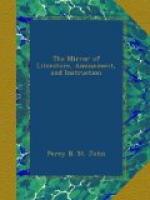W.G.C.
* * * * *
ACCOUNT OF THE IRISH MANTLE.
Edmund Spencer (the English poet) in his View of the State of Ireland, says—“First the outlaw, being for his many crimes and villanies banished from the towns and houses of honest men, and wandering in waste places, far from danger of law, maketh his mantle his house, and under it covereth himself from the wrath of heaven, from the offence of the earth, and from the sight of men. When it raineth, it is his pent-house; when it bloweth, it is his tent; when it freezeth, it is his tabernacle. In summer he can wear it loose; in winter he can wrap it close; at all times he can use it—never heavy, never cumbersome. Likewise for a rebel it is as serviceable; for in his warre that he maketh, (if at least it deserve the name of warre), when he still flyeth from his foe, and lurketh in the thick woods and strait passages, waiting for advantages, it is his bed, yea, and almost his household stuff; for the wood is his house against all weathers, and his mantle is his couch to sleep in. Therein he wrappeth himselfe round, and coucheth himself strongly against the gnats, which in that country doe more annoye the naked rebells, whilst they keepe the woods, and doe more sharply wound them than all their enemies’ swords, or spears, which can seldome come nigh them; yea, and oftentimes their mantle serveth them, when they are neare driven, being wrapped about their left arme, instead of a target, for it is hard to cut through




